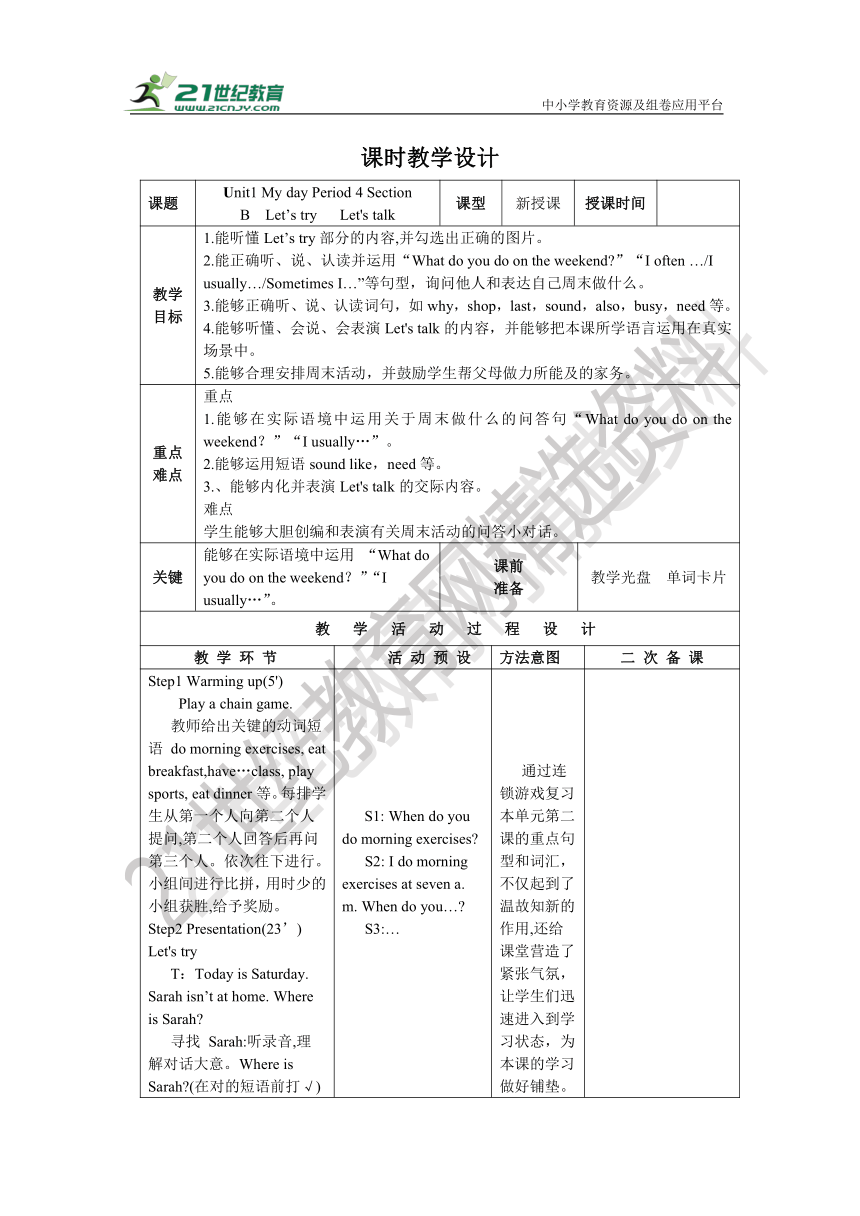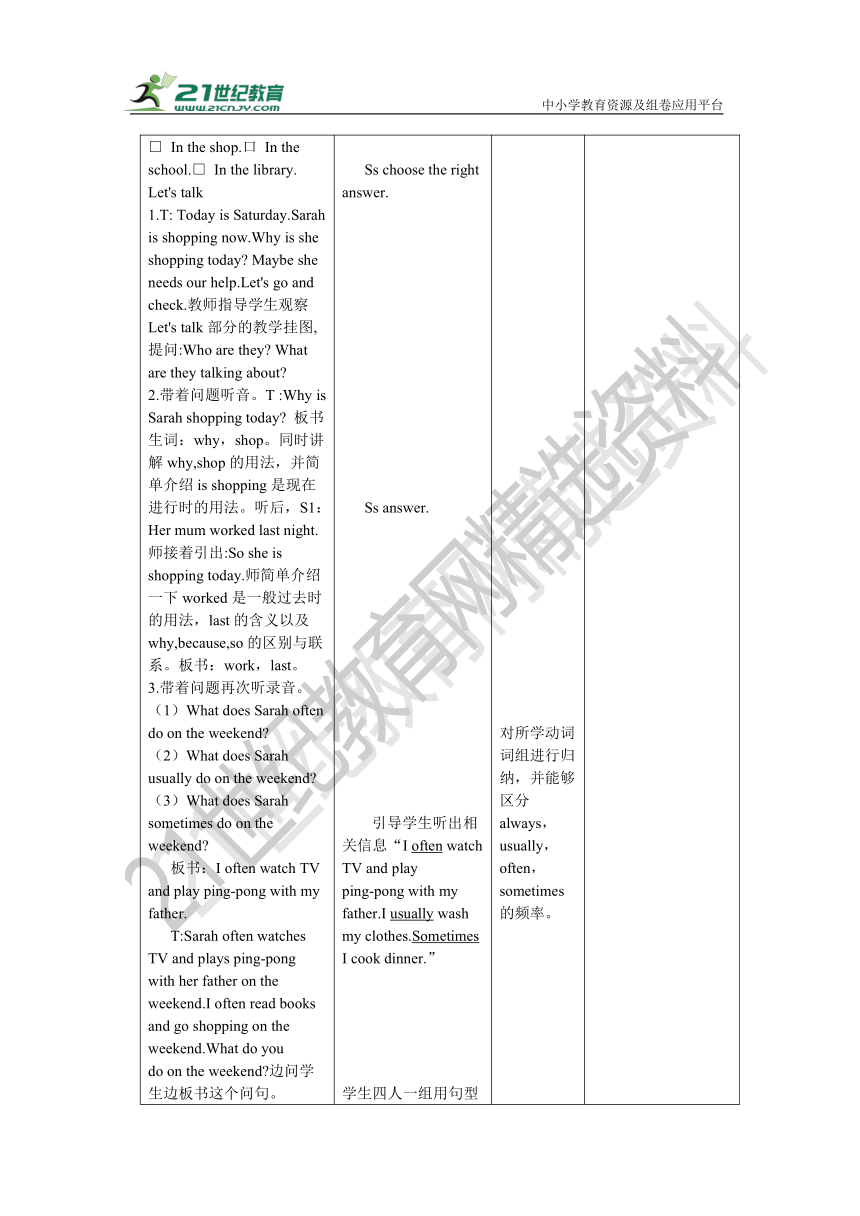【课堂跟踪】Unit1 My day B Let’s try Let's talk 教案
文档属性
| 名称 | 【课堂跟踪】Unit1 My day B Let’s try Let's talk 教案 |  | |
| 格式 | docx | ||
| 文件大小 | 132.7KB | ||
| 资源类型 | 试卷 | ||
| 版本资源 | 人教版(PEP) | ||
| 科目 | 英语 | ||
| 更新时间 | 2021-01-14 14:02:47 | ||
图片预览


文档简介
课时教学设计
课题
Unit1 My day Period 4 Section
B Let’s try Let's talk
课型
新授课
授课时间
教学
目标
1.能听懂Let’s try部分的内容,并勾选出正确的图片。
2.能正确听、说、认读并运用“What do you do on the weekend?”“I often …/I
usually…/Sometimes I…”等句型,询问他人和表达自己周末做什么。
3.能够正确听、说、认读词句,如why,shop,last,sound,also,busy,need等。
4.能够听懂、会说、会表演Let's talk的内容,并能够把本课所学语言运用在真实场景中。
5.能够合理安排周末活动,并鼓励学生帮父母做力所能及的家务。
重点难点
重点
1.能够在实际语境中运用关于周末做什么的问答句“What do you do on the weekend?”“I usually…”。
2.能够运用短语sound like,need等。
3.、能够内化并表演Let's talk的交际内容。
难点
学生能够大胆创编和表演有关周末活动的问答小对话。
关键
能够在实际语境中运用 “What do you do on the weekend?”“I usually…”。
课前
准备
教学光盘 单词卡片
教 学 活 动 过 程 设 计
教 学 环 节
活 动 预 设
方法意图
二 次 备 课
Step1 Warming up(5')
Play a chain game.
教师给出关键的动词短语 do morning exercises, eat breakfast,have…class, play sports, eat dinner等。每排学生从第一个人向第二个人提问,第二个人回答后再问第三个人。依次往下进行。小组间进行比拼,用时少的小组获胜,给予奖励。
Step2 Presentation(23’)
Let's try
T:Today is Saturday.
Sarah isn’t at home. Where is Sarah?
寻找 Sarah:听录音,理解对话大意。Where is Sarah?(在对的短语前打√)□ In the shop.口 In the school.□ In the library.
Let's talk
1.T: Today is Saturday.Sarah is shopping now.Why is she
shopping today? Maybe she needs our help.Let's go and check.教师指导学生观察 Let's talk部分的教学挂图,提问:Who are they? What are they talking about?
2.带着问题听音。T :Why is Sarah shopping today? 板书生词:why,shop。同时讲解why,shop的用法,并简单介绍is shopping是现在进行时的用法。听后,S1:Her mum worked last night.师接着引出:So she is shopping today.师简单介绍一下worked是一般过去时的用法,last的含义以及why,because,so的区别与联系。板书:work,last。
3.带着问题再次听录音。
(1)What does Sarah often do on the weekend?
(2)What does Sarah usually do on the weekend?
(3)What does Sarah sometimes do on the weekend?
板书:I often watch TV and play ping-pong with my father.
T:Sarah often watches TV and plays ping-pong with her father on the weekend.I often read books and go shopping on the weekend.What do you
do on the weekend?边问学生边板书这个问句。
板书:What do you do on the weekend?
4.Ask the question and then pass it on.
教师适时地说:That sounds like a lot of fun.并讲解sound like的用法。板书:sound。
5.观看对话视频,进一步感知整个对话的情景,帮助学生在语境中理“You’re so busy!You need a robot to help you!”的意思,讲解also,busy,need的用法。板书:also,busy,need。
6.轻声跟读,齐读,分角色朗读,为视频配音。
Step3 Practice(6’)
1.Fill in the blanks.
2.创编对话并表演,师生共评。
Step4 Consolidation and Extension(5’)
Task Time.
1.Make a dialogue.
2.Make a dialogue.
3.Do a survey.
4.Make a dialogue:
给每个小组一个任务,在组内进行练习。教师可以给难度大的小组一些支撑性材料。例如 Task Time④,这一小组的任务是本节课内容的延伸,而且也具有很好的德育作用。难度稍大。教师可以给一些句型作支撑: I often help my mother wash clothes on weekends. I love my family等等。
各小组依次上前表演展示,师生共同评价,找出表演者的优点和缺点。
Step5 Summary(1’)
1. Words:
why, shop, last, sound, also, busy, need
2.Sentences:
--What do you do on the
weekend?
—I usually/often/
sometimes …
S1: When do you do morning exercises?
S2: I do morning exercises at seven a. m. When do you…?
S3:…
Ss choose the right answer.
Ss answer.
引导学生听出相关信息“I often watch TV and play ping-pong with my father.I usually wash my clothes.Sometimes I cook dinner.”
学生四人一组用句型“What do you do on the weekend? I always/usually / often
/sometimes…”短语“do homework,watch TV,have
…class,play sports with…,play music,wash my clothes…”交流周末活动(也可拓展短语,如:clean my bedroom,sweep the floor,do the dishes,water the flowers等)。
学生观看视频,感知对话情景,理解大意。
学生轻声跟读、齐读、分角色为视频配音。
A:Why are you shopping today?
B:My mom worked last night.So I'm shopping today.
A:Good girl! So what do you do on the weekend?
B:I often watch TV and play ping-pong with my father.
A:That sounds like a lot of fun.
B:Yes, but I'm also hard- working.I usually wash my clothes. Sometimes I cook dinner.
A:You’re so busy! You need a robot to help you!
1.学生就自己的周末活动进行真实交流,鼓励学生运用本板块的核心句型。
2.创编一个有关周末活动的小对话。
3.邀请小伙伴们周末一起出去活动,商讨活动内容。
4.调查本组内的同学在周末通常做什么。父母很辛苦,我们应该在周末时帮助父母或陪伴父母做些事情。说说你是怎么帮助父母的。
通过连锁游戏复习本单元第二课的重点句型和词汇,不仅起到了温故知新的作用,还给课堂营造了紧张气氛,让学生们迅速进入到学习状态,为本课的学习做好铺垫。
对所学动词词组进行归纳,并能够区分always,
usually,often,
sometimes的频率。
模仿教师所呈现的新语言,做机械的句型操练,并在真实的交流语境中帮助学生理解That sounds like a lot of fun.的含义。
阅读前,通过之前的词句学习以及创设情景突破课文中的重点句型和一些生疏的单词,为课文扫清语言障碍;阅读中内化课文语言点和信息;阅读后学生进行表演,输出语言知识,能够有效地提高学生的语言运用能力。
鼓励学生洪亮地、有感情地朗读,引导其他学生认真倾听,对模仿惟妙惟肖的学生及时给与表扬。
本环节为巩固部分,给每组学生清晰的任务,从简单易行的题目到略有难度,设计具有梯度性,各种层次的学生都能找到自己的角色,同时创编对话也能够培养学生的创新精神和使用语言进行交流的能力。
作业
设计
Homework:
1.Recite and write down the words and sentences.背诵并默写重点单词和句型。
2.Listen and recite the dialogue.听录音并背诵对话。
板书
设计
Unit 1 My day B Let’s try Let's talk
why shop work last
sound also busy need
—What do you do on the weekend?
go shopping.
watch TV.
—I usually/often + play ping-pong.
clean my room.
wash my clothes.
教学反思
课题
Unit1 My day Period 4 Section
B Let’s try Let's talk
课型
新授课
授课时间
教学
目标
1.能听懂Let’s try部分的内容,并勾选出正确的图片。
2.能正确听、说、认读并运用“What do you do on the weekend?”“I often …/I
usually…/Sometimes I…”等句型,询问他人和表达自己周末做什么。
3.能够正确听、说、认读词句,如why,shop,last,sound,also,busy,need等。
4.能够听懂、会说、会表演Let's talk的内容,并能够把本课所学语言运用在真实场景中。
5.能够合理安排周末活动,并鼓励学生帮父母做力所能及的家务。
重点难点
重点
1.能够在实际语境中运用关于周末做什么的问答句“What do you do on the weekend?”“I usually…”。
2.能够运用短语sound like,need等。
3.、能够内化并表演Let's talk的交际内容。
难点
学生能够大胆创编和表演有关周末活动的问答小对话。
关键
能够在实际语境中运用 “What do you do on the weekend?”“I usually…”。
课前
准备
教学光盘 单词卡片
教 学 活 动 过 程 设 计
教 学 环 节
活 动 预 设
方法意图
二 次 备 课
Step1 Warming up(5')
Play a chain game.
教师给出关键的动词短语 do morning exercises, eat breakfast,have…class, play sports, eat dinner等。每排学生从第一个人向第二个人提问,第二个人回答后再问第三个人。依次往下进行。小组间进行比拼,用时少的小组获胜,给予奖励。
Step2 Presentation(23’)
Let's try
T:Today is Saturday.
Sarah isn’t at home. Where is Sarah?
寻找 Sarah:听录音,理解对话大意。Where is Sarah?(在对的短语前打√)□ In the shop.口 In the school.□ In the library.
Let's talk
1.T: Today is Saturday.Sarah is shopping now.Why is she
shopping today? Maybe she needs our help.Let's go and check.教师指导学生观察 Let's talk部分的教学挂图,提问:Who are they? What are they talking about?
2.带着问题听音。T :Why is Sarah shopping today? 板书生词:why,shop。同时讲解why,shop的用法,并简单介绍is shopping是现在进行时的用法。听后,S1:Her mum worked last night.师接着引出:So she is shopping today.师简单介绍一下worked是一般过去时的用法,last的含义以及why,because,so的区别与联系。板书:work,last。
3.带着问题再次听录音。
(1)What does Sarah often do on the weekend?
(2)What does Sarah usually do on the weekend?
(3)What does Sarah sometimes do on the weekend?
板书:I often watch TV and play ping-pong with my father.
T:Sarah often watches TV and plays ping-pong with her father on the weekend.I often read books and go shopping on the weekend.What do you
do on the weekend?边问学生边板书这个问句。
板书:What do you do on the weekend?
4.Ask the question and then pass it on.
教师适时地说:That sounds like a lot of fun.并讲解sound like的用法。板书:sound。
5.观看对话视频,进一步感知整个对话的情景,帮助学生在语境中理“You’re so busy!You need a robot to help you!”的意思,讲解also,busy,need的用法。板书:also,busy,need。
6.轻声跟读,齐读,分角色朗读,为视频配音。
Step3 Practice(6’)
1.Fill in the blanks.
2.创编对话并表演,师生共评。
Step4 Consolidation and Extension(5’)
Task Time.
1.Make a dialogue.
2.Make a dialogue.
3.Do a survey.
4.Make a dialogue:
给每个小组一个任务,在组内进行练习。教师可以给难度大的小组一些支撑性材料。例如 Task Time④,这一小组的任务是本节课内容的延伸,而且也具有很好的德育作用。难度稍大。教师可以给一些句型作支撑: I often help my mother wash clothes on weekends. I love my family等等。
各小组依次上前表演展示,师生共同评价,找出表演者的优点和缺点。
Step5 Summary(1’)
1. Words:
why, shop, last, sound, also, busy, need
2.Sentences:
--What do you do on the
weekend?
—I usually/often/
sometimes …
S1: When do you do morning exercises?
S2: I do morning exercises at seven a. m. When do you…?
S3:…
Ss choose the right answer.
Ss answer.
引导学生听出相关信息“I often watch TV and play ping-pong with my father.I usually wash my clothes.Sometimes I cook dinner.”
学生四人一组用句型“What do you do on the weekend? I always/usually / often
/sometimes…”短语“do homework,watch TV,have
…class,play sports with…,play music,wash my clothes…”交流周末活动(也可拓展短语,如:clean my bedroom,sweep the floor,do the dishes,water the flowers等)。
学生观看视频,感知对话情景,理解大意。
学生轻声跟读、齐读、分角色为视频配音。
A:Why are you shopping today?
B:My mom worked last night.So I'm shopping today.
A:Good girl! So what do you do on the weekend?
B:I often watch TV and play ping-pong with my father.
A:That sounds like a lot of fun.
B:Yes, but I'm also hard- working.I usually wash my clothes. Sometimes I cook dinner.
A:You’re so busy! You need a robot to help you!
1.学生就自己的周末活动进行真实交流,鼓励学生运用本板块的核心句型。
2.创编一个有关周末活动的小对话。
3.邀请小伙伴们周末一起出去活动,商讨活动内容。
4.调查本组内的同学在周末通常做什么。父母很辛苦,我们应该在周末时帮助父母或陪伴父母做些事情。说说你是怎么帮助父母的。
通过连锁游戏复习本单元第二课的重点句型和词汇,不仅起到了温故知新的作用,还给课堂营造了紧张气氛,让学生们迅速进入到学习状态,为本课的学习做好铺垫。
对所学动词词组进行归纳,并能够区分always,
usually,often,
sometimes的频率。
模仿教师所呈现的新语言,做机械的句型操练,并在真实的交流语境中帮助学生理解That sounds like a lot of fun.的含义。
阅读前,通过之前的词句学习以及创设情景突破课文中的重点句型和一些生疏的单词,为课文扫清语言障碍;阅读中内化课文语言点和信息;阅读后学生进行表演,输出语言知识,能够有效地提高学生的语言运用能力。
鼓励学生洪亮地、有感情地朗读,引导其他学生认真倾听,对模仿惟妙惟肖的学生及时给与表扬。
本环节为巩固部分,给每组学生清晰的任务,从简单易行的题目到略有难度,设计具有梯度性,各种层次的学生都能找到自己的角色,同时创编对话也能够培养学生的创新精神和使用语言进行交流的能力。
作业
设计
Homework:
1.Recite and write down the words and sentences.背诵并默写重点单词和句型。
2.Listen and recite the dialogue.听录音并背诵对话。
板书
设计
Unit 1 My day B Let’s try Let's talk
why shop work last
sound also busy need
—What do you do on the weekend?
go shopping.
watch TV.
—I usually/often + play ping-pong.
clean my room.
wash my clothes.
教学反思
